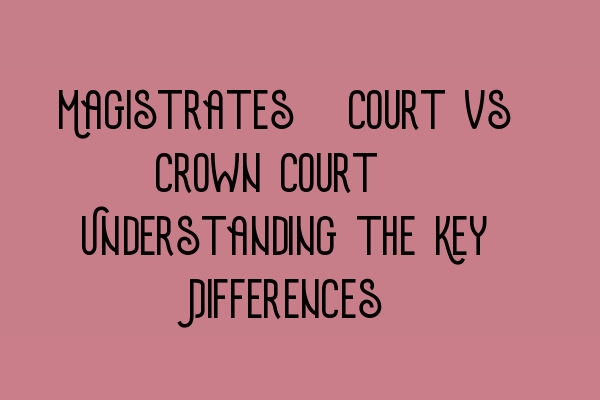Magistrates’ Court vs Crown Court: Understanding the Key Differences
When it comes to criminal law proceedings in the United Kingdom, two important venues play a significant role: the Magistrates’ Court and the Crown Court. Understanding the distinctions between these two courts is essential for defendants, legal professionals, and anyone seeking information about the criminal justice system in the UK.
The Magistrates’ Court, as the name suggests, is presided over by Magistrates, who are laypersons without formal legal qualifications. They receive training to carry out their duties and work in panels of three, commonly known as the bench. The Magistrates’ Court handles the majority of criminal cases and acts as the initial entry point into the criminal justice system. This court deals with summary offenses, which are less serious criminal offenses, such as minor theft, public order offenses, and some driving offenses.
On the other hand, the Crown Court is presided over by professional judges, consisting of High Court judges, Circuit judges, and Recorders. This court deals with more complex and serious criminal cases, including indictable offenses. Indictable offenses are the most serious criminal offenses, such as murder, rape, and drug trafficking. The Crown Court is responsible for conducting trials with a jury and has the power to impose longer prison sentences than the Magistrates’ Court.
One of the key differences between the Magistrates’ Court and the Crown Court is the power to grant bail. In the Magistrates’ Court, the Magistrates have the authority to decide whether an accused person should be granted bail or be remanded in custody pending trial. However, in the Crown Court, only the judge has the power to make decisions regarding bail. Generally, defendants facing more serious charges are more likely to be remanded in custody.
Another significant distinction is the type of legal professionals who operate in each court. In the Magistrates’ Court, you are likely to find solicitors, who provide legal advice, and sometimes barristers, who represent clients during trials. The Crown Court, on the other hand, is typically the realm of barristers, who specialize in advocacy and trial work. Solicitors may still be present to assist with legal matters, but the majority of courtroom proceedings are handled by barristers.
It is also important to note that the Crown Court has the jurisdiction to hear appeals from the Magistrates’ Court. If a defendant disagrees with the decision made by the Magistrates’ Court, they can apply to the Crown Court for a review of their case. This allows for a higher level of judicial review and potentially a different outcome.
Understanding these differences between the Magistrates’ Court and the Crown Court is crucial for defendants and legal professionals alike. It helps inform individuals about the legal process they may face and provides insight into the roles and responsibilities of each court. Whether you are preparing for the SQE exams or seeking general knowledge about criminal law in the UK, having a solid understanding of the distinctions between the Magistrates’ Court and the Crown Court is invaluable.
For more information on the SQE exams and preparation courses, check out our related articles:
